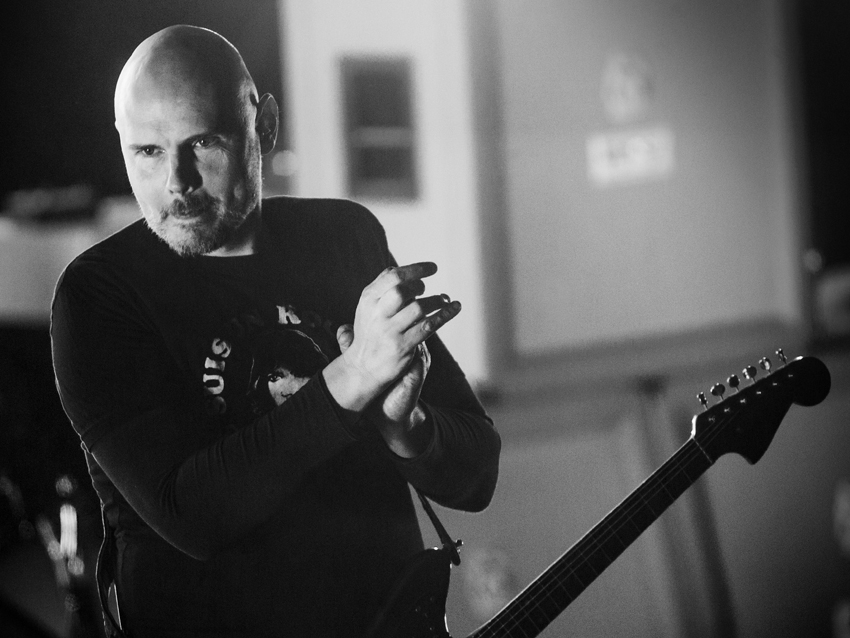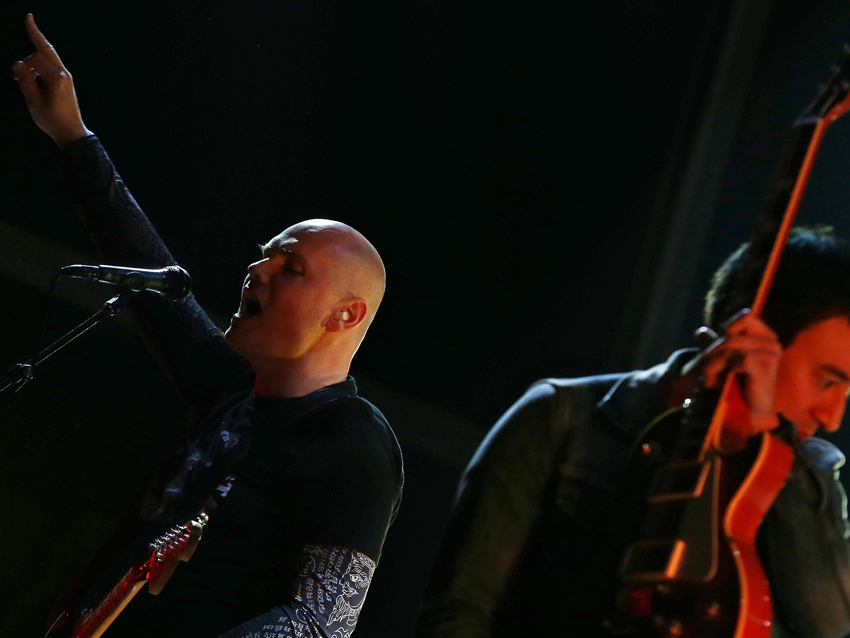
Billy Corgan talks Tommy Lee, new Smashing Pumpkins albums for 2015
Billy Corgan has always been a big-picture kind of guy. For The Smashing Pumpkins’ third album, 1995’s Mellon Collie And The Infinite Sadness, he wrote so many songs that he needed two separate CDs to contain them all.
In 2000, the Pumpkins released Machina/ The Machines Of God, which was answered that same year by a sequel, Machina II/ The Friends & Enemies Of Modern Music. And for sheer mother-of-concept-album-ness, there’s no beating the 44-song Teargarden by Kaleidyscope from 2009, which expanded to include Oceania, the “album within an album,” released in 2012.
So it’s not entirely out of character for Corgan to be eyeing the release of two separate Smashing Pumpkins albums in 2015 – Monuments To An Elegy will be followed by Day For Night, respectively – but the mercurial musician did turn a few heads recently when he announced that Motley Crue drummer Tommy Lee was beating the skins on all nine tracks of the first set. "Tommy is arguably the best two-and-four fuckin’ rock drummer to ever happen,” Corgan raves. “That’s where even the idea of even asking him to play on the record came from – it needed that kind of swagger, the kind of feeling that only Tommy can bring to it."
Corgan sat down with MusicRadar to talk about the upcoming albums, working with Lee, guitar sounds, and what he thinks it might take to grab today’s fickle and distracted music fans.
You've done the long-form approach to albums in the past, but why did you want to go with two albums and two titles for this new batch of songs?
“It’s a combination of things. I think in the modern world information is digested so quickly, so the problem with doing a double album is that whatever the general verdict on the new album would be, it would come within the first 48 hours of release. The other 50 percent of the material, CD 2 or whatever it is in this world... I mean, would it even be listened to? The chances of that are very, very small. That’s pretty much been proven out for me during the last seven to 10 years.
“What you hear from everybody these days is the same thing: ‘I have no time.’ [Laughs] The information age was supposed to give us more time, not less. But now we’re doing more multi-tasking than ever, and I’m included in that. So we thought, ‘Why don’t we do shorter albums that are more focused and have more punch to them?’ The idea was to spread them out within six to nine months of each other and get the kind of sustain in the world that one album just doesn’t generate anymore.
“Even with Oceania, we got a lot of good feedback on it – the sales were there and all of those things – but once we got past the 120-day mark, the public just moved on to other things. You know, it’s not personal. It’s not a rejection or a repudiation – it’s just, ‘Oh, there’s all of those other stuff to pay attention to.’”
Music has a faster burn than before.
“Yeah, so I think you can look at what pop-rock groups did in 1964: They were releasing two to three albums a year, and the public was digesting that material very quickly based on one or two singles, and then they moved on to the next. I think we’re pretty much back to that model.”
You have these new songs, these groups of songs, and you have the titles – maybe they’re change –
“No, no, I’m gonna stick to them.”
OK, so did you say, ‘This group of songs goes to Monuments To An Elegy and that group of songs goes to Day For Night’? Or is it more amorphous than that?
“You know, it’s really like fumbling in the dark. [Laughs] You know how candid I am about things… I really don’t know anymore what makes a good album. For example, you get this beautiful revisionist idea that if you’ve had success, people will say to you, ‘Oh, it’d be cool if you do that again.’ But the fact of the matter is, if I put out one of those albums in this current system – or place or whatever you want to call it – I don’t think the reaction would be the same."

Today's listening habits
“That doesn’t mean that people wouldn’t think the records were good; I just don’t think you’d get that depth of listening. So, for me and the world that I grew up in, if you’re not listening to the material with any kind of depth or introspection, that’s not good. I don’t fall into the same category as most people these days, which is ‘one song equals great.’ It’s just not my style or the way I was brought up. So what is a good album? Well, I say a good album is one that’s actually going to be heard.
“Maybe it’s something with a little more focus, something with a little less prog-rock, something with a little bit more sizzle. Maybe time is an issue there as well. So we’re experimenting, you know? So far, the first album is very much a kind of grab-you-by-the-lapels thing. Hey, I can still write a good song. [Laughs] That’s the general idea. It’s not much more intellectual than that.
“It’s still about excitement, right? So what is my version of excitement at this point in my life, still under the banner of ‘Smashing Pumpkins’? I don’t think it’s that same old formula; I don’t see where people would listen to it. I think Oceania was in the neighborhood of that, and I didn’t see the level of listening that I would have liked. To me, that just says, ‘Well, I’m wasting my time’ – and, by extension, somebody else’s.
“I think that alternative bands – somewhat, not everybody – we fall into this thing of no longer competing. We’ve let pop kind of dominate the conversation. Of course, there are quote-unquote alternative bands, if you can even call them alternative bands, that are having pop success, but they tend to be doing it with pop music. So my idea is to go back to being competitive. If a cool, beautiful, deep prog-rock record isn’t gonna get it done, there’s other things I’d like to do with my summer than be in a dark room making seven-minute opuses.” [Laughs]
Tommy Lee played on half of the recordings, but what about Mike Byrne – will he be on the rest?
“Tommy Lee is the drummer on the Monuments album. Mike, like Elvis, has left the building.”
Oh… Do you want to talk about that?
“Mmm… Let’s just say that Mike, like Elvis, has left the building.”

On recording with Tommy Lee
Then let’s talk about your decision to use another drummer. Were other names floated around before you set your sights on Tommy?
“No. No, I talked about it on my blog. We were sitting saying, ‘It would be great to get somebody who can play like this,’ and Jeff [Schroeder] said, ‘Why don’t we get the real deal?’ It was that simple.” [Laughs]
What if Tommy weren't available? He’s got the big tour coming up – did you have any other names?
“You know, we hadn’t even gone down that road. There’s been some beautiful synchronicity with this album; things have just tended to line up. One thing that I need to say… I think the main point to the band – and I put ‘band’ in quotations because obviously there’s been a lot of arguments over the last seven years about what that means – I think the main point to the band in 2014 is, I want to make a certain kind of music. If I want to make that kind of music, then it’s best made under the name ‘Smashing Pumpkins.’ Where Jeff and I are at is, ‘What do we need to do to do that?’
“[It’s about] making rock ‘n’ roll in 2014 in a world that tends to be going away from guitars. Turn on any alternative station – you’re not hearing a lot of riffs. And we’re not a metal band, nor do we try to be, although we love to play that – and we just played with one of the great rock-metal drummers. I reached a point of transparency within myself where I don’t feel the need to explain to anybody else why I’m doing what I’m doing. The real key is, ‘Do I know what I’m doing and why I’m doing it, and am I having a good time doing it?’
“That seems to generate the kind of music that people want. All of the other stuff, all the other political stuff, doesn’t work out that way. So I just shrug my shoulders. If that makes me no different from some of my contemporaries who have a band name but it’s really just one or two dudes, then so be it.”
What was the process of getting Tommy’s drum parts recorded?
“I went out to LA and played him the demos we had – he loved them, got ‘em right away. Then I came back to Chicago and demoed more specifically with the idea of him tracking the drums to them. Then I went back to LA and worked out all the drum parts, which of course further refined some of the arrangements, came back to Chicago and redid the demos again, and then I went to LA to cut the final drums.
“The reason why I did that was because I wasn’t interested in just ‘Hey, isn’t it cool that Tommy Lee is on the album?’ I wanted to work with Tommy as intimately as I could so we could find common ground, so that when you hear the music it sounds like we’re playing together. It’ll sound like he’s in the band, not just the stunt drummer that I called in to dazzle and amaze. The results have been fantastic; the people who’ve heard it are like, ‘Holy shit, I can’t believe how cool this is!’
“It’s so immediate – the songs are so immediate, and the way Tommy plays is so immediate. Everybody seems to get it right away. There’s an immediacy to the music that is more like me circa 1995 than, say, me anything since then.”

On re-creating the past
In an interview, Tommy did say that the recordings reminded him of the first couple of Smashing Pumpkins albums. Is that a fair reference in your view?
“I see where people might read that and think that sonically it reminds them of that stuff. I don’t see it that way. I think what he was saying was that it has the energy and the exuberance and the sort of passion of that music. Production-wise, it’s very modern. It's definitely guitars, make no mistake, but it doesn’t sound like either he or I are stepping back in time. He’s not playing like it’s 1983, and I’m not playing like it’s 1993. It’s both of us, myself as the songwriter and him as a great musician, interpreting these songs and being in 2014.
“The reason why I’m being so cautious about that is because I don’t want people jumping to some sort of weird conclusions. This is contemporary music... Anybody who thinks, you know, pick your album ‘He’s doing it all over again,’ I’m just not in that business. There’s this nascent tendency on my end of the street with people wishing that this magical thing were going to happen, where some album is going to be re-created. There’s even this weird recording floating around on the internet that was purported to be a leaked demo. Some fan sent it to me and I listened to it, and it sounded like somebody did their modern version of Siamese Dream in their bedroom. And I’m like, ‘C’mon... I’ve learned a few more chords in the last 20 fucking years!” [Laughs]
Did you give Tommy a lot of direction when cutting the tracks?
“Oh, no. Not at all. I think the only thing relatable to that question is that there were certain idiomatic style things, like if I was talking about Echo & The Bunnymen, well, he doesn’t necessarily know that album. So there were points of translation on a more emotional level where I might have explained something than just ‘Yeah, play it like the guy in Echo & The Bunnymen.’ That’s not music that he might’ve grown up and listened to.
“But you don’t have to tell him what to do. He’s right up there. The two most intuitive musicians I’ve ever worked with are Jimmy Chamberlin and Tommy Lee. You sit there in the back as you’re watching it happen and you think, ‘There’s a reason why this guy has sold so many records' – and I’m looking at it. It’s a certain feel, a certain swing, a certain approach to music and a real love of music. Both Tommy and Jimmy have that. They just know what to do – there’s no hand-holding.”

On playing guitar with Jeff Schroeder
You wrote on The Panopticon that the guitars sound "more so on the epic side of things than, say, grossly metallic." Care to elaborate on that?
“It probably has more to do with space than density. There’s a lot this modern tone – I don’t want to name names – a kind of midrange in the modern sound with smaller guitars that sound big. I’ve tended to go in the other direction with the scooped-Hetfield sound, a lot of low end, a lot of attack. So in trying to find new ways to skin the cat – a bad analogy… ‘bake the apple’?...”
“Skin the cat”? I haven’t heard anybody use that one in years.
“Yeah, I need a new analogy dictionary. [Laughs] I was just on the cover of an animal charity magazine too, holding my two cats – not the best analogy to use. I do love my cats, so I’ve got to be careful... In trying to find a new way to reinvent the wheel for the 19th time – there’s a phrase – Jeff and I have talked a lot about gain structures. What was it about Judas Priest in 1975 that attracts us now that maybe we didn’t get in the ‘80s because we were so obsessed with gain?
“The point being that density has been done, high-gain has been done, and so we’ve regressed to maybe a lesser gain sound, which has really opened up our playing, and so now it’s more about how we play off of each other. I would say that the closest analogy would be that beautiful thing you see between KK Downing and Glenn Tipton, where two lead guitarists with specific styles play together and make a bigger sound.
“Jeff and I, now that we’ve played together for seven years, we’ve figured out how to do that. So unlike a lot of the albums – including Oceania, where a lot of the rhythm tracks might have just been me doubling myself to get the super-tight thing – this one will be old school: Billy on the left, Jeff on the right.”
Do you have a ballpark idea when you want to put the albums out – and how much of a gap will be between them?
“Shooting for a single by October – possibly sooner, but I guess October, November at the latest – and then an album will probably be February. As for the timetable between the two albums, I worked it out contractually that it’d be no more than nine months, so I’m going to try to stick to that. I’m sure [BMG] would be fine if it were longer, but I’d like to keep it short. I’m just really tired from doing this one. We’re obviously trying to get it done, and so the idea of finishing and rolling right into the next record seems like a strange kind of a slow-motion suicide. [Laughs] It’s like being one of the teams in the play-offs – we’ve just gotta win this game first and we’ll get to the other game later.”
Joe is a freelance journalist who has, over the past few decades, interviewed hundreds of guitarists for Guitar World, Guitar Player, MusicRadar and Classic Rock. He is also a former editor of Guitar World, contributing writer for Guitar Aficionado and VP of A&R for Island Records. He’s an enthusiastic guitarist, but he’s nowhere near the likes of the people he interviews. Surprisingly, his skills are more suited to the drums. If you need a drummer for your Beatles tribute band, look him up.
